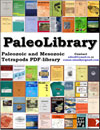
Complete Data Base of Paleozoic and Mesozoic Tetrapods.
Paleo-News and illustrations. Big electronic PDF-library.
| |
| PaleoNews |
| Classification |
| Books and Articles |
| Contact |
| Forum |
сайт о динозаврах
рейтинг сайтов
Free Counter
myspace hit counter
Rates of morphological evolution in Early Cretaceous birds |
April 6, 2016 The Early Cretaceous is a critical interval in the early history of birds. Exceptional fossils indicate that important evolutionary novelties such as a pygostyle and a keeled sternum had already arisen in Early Cretaceous taxa, bridging much of the morphological gap between Archaeopteryx and crown birds. However, detailed features of basal bird evolution remain obscure because of both the small sample of fossil taxa previously considered and a lack of quantitative studies assessing rates of morphological evolution. Here we apply a recently available phylogenetic method and associated sensitivity tests to a large data matrix of morphological characters to quantify rates of morphological evolution in Early Cretaceous birds. Our results reveal that although rates were highly heterogeneous between different Early Cretaceous avian lineages, consistent patterns of significantly high or low rates were harder to pinpoint. Nevertheless, evidence for accelerated evolutionary rates is strongest at the point when Ornithuromorpha (the clade comprises all extant birds and descendants from their most recent common ancestors) split from Enantiornithes (a diverse clade that went extinct at the end-Cretaceous), consistent with the hypothesis that this key split opened up new niches and ultimately led to greater diversity for these two dominant clades of Mesozoic birds. Min Wang & Graeme T. Lloyd (2016) |
